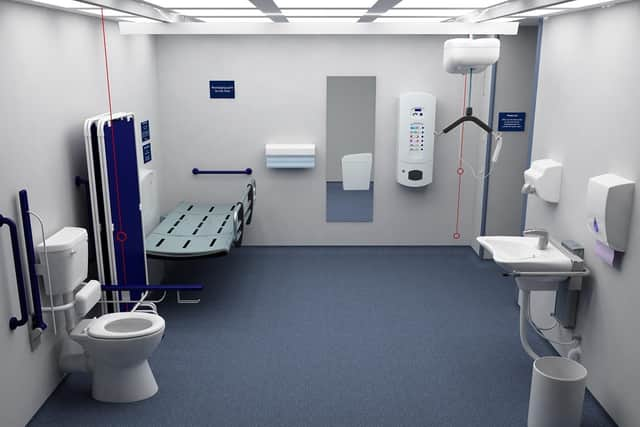Call for more accessible and 'Changing Places' toilets in South Tyneside
and live on Freeview channel 276
A motion presented to South Tyneside Council’s full meeting on Thursday, November 24, aimed to recognise the work of charity Crohn’s and Colitis UK.
This included calls to encourage venues providing accessible toilets to install new signage to help “stop stigma and discrimination” towards people with Crohn’s Disease, Ulcerative Colitis and other “invisible conditions”.
Advertisement
Hide AdAdvertisement
Hide AdCouncillors were asked to ensure accessible toilets were “properly signposted for residents and visitors”.


This included new Changing Places toilets for “severely disabled people”, which are expected to be made compulsory for large new buildings such as shopping centres, supermarkets, sports and arts venues.
Other pledges in the motion included training for council staff, developing an updated directory of all Changing Places toilets and carrying out a survey to identify locations suitable for adaption and updates, as well as looking at new funding sources to upgrade facilities.
Crohn’s Disease and Ulcerative Colitis are the two main forms of Inflammatory Bowel Disease (IBD) and according to data presented to councillors, around 1,300 South Tyneside residents have some form of IBD.
Labour councillor Anne Hetherington, cabinet member for adults, health and independence, launched the motion which outlined steps to help residents and visitors “comfortably enjoy” South Tyneside – including its coastline, visitor attractions and town centres.
Advertisement
Hide AdAdvertisement
Hide AdCouncillors heard that the council had been awarded £140,000 from the Central Government’s Changing Places Fund towards this agenda and is awaiting a decision on another bid for £55,000.
Cllr Hetherington added: “We must ensure that this money is used appropriately to build on and enhance the facilities available across South Tyneside”.
Independent councillor, councillor Glenn Thompson, raised concerns about public toilet coverage in the borough, noting there were only “seven locations”, and called for a borough-wide review of facilities.
While welcoming Government funding, the opposition leader said it focused on “upgrading and adapting current facilities but not adding new facilities at new locations”.
Cllr Thompson added: “I know there are many aids available, such as just can’t wait cards and the radar key scheme which was mentioned, but we don’t have a good level of awareness for these aids and more significantly, we don’t have the coverage of facilities to back up their use.
Advertisement
Hide AdAdvertisement
Hide Ad“At the most most fundamental level, as mentioned in this motion, all residents and visitors need to know where facilities are located”.
Cllr Hetherington, responding, said council officers were looking at facilities and “how best the funding can be spent” as well as doing a survey and updating the council’s directory on locations across the borough.
After being put to the vote, the motion won unanimous support across the council chamber.
This saw South Tyneside Council agree to:
:: Ensure that as a council we identify suitable Changing Places locations around the borough and make sure these are properly signposted for residents and visitors.
Advertisement
Hide AdAdvertisement
Hide Ad:: Work collaboratively with partners and local businesses, town centre retailers, supermarkets, and leisure outlets to do likewise with their accessible toilets.
:: Seek advice from the charity Crohn’s & Colitis UK on the information and training we should provide to council staff members. This is so they understand these conditions and to prevent potential embarrassment for those who suffer with them. To work collaboratively with partners and local businesses, to encourage them to do the same.
:: Have an updated directory on the council website of all publicly accessible Changing Places across South Tyneside, and feed this into the national directory.
:: Carry out a survey of all public facilities to identify other locations suitable to be adapted and updated.
:: To look for other funding sources to upgrade facilities around the borough.